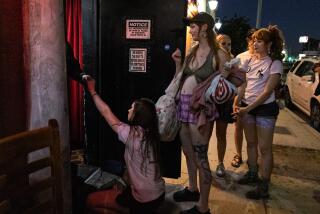Bolshoi Ballet Interrupts ‘Giselle’ to Air Grievances : Dance: The troupe strikes over pay and the ‘civil war’ between management about the proposed contract system.
- Share via
MOSCOW — Giselle’s desperately graceful death was postponed for 20 minutes Thursday as the Bolshoi Ballet stopped the show to protest pay and management conditions.
As house lights dimmed in the red-and-gold hall and the orchestra did not play, opera singer Yevgeny T. Raikov informed the hushed, bejeweled audience that Bolshoi performers had decided to protest after the Russian government ignored their second no-confidence vote in theater director Vladimir M. Kokonin.
“We apologize to you, dear spectators,” Raikov said, as titters vibrated through the beloved theater, now in its 219th season.
Backstage, the cast of “Giselle” waited 20 anxious minutes to see whether director Kokonin would make good on his threats to cancel the performance of the tragic French ballet, if the prestigious Bolshoi cast dared make public their grievances.
“We want the government to pay attention to what is going on inside the walls of the Bolshoi Theater,” explained a tuxedoed Gennady Butov from the orchestra, while fellow musicians sat in silence. “It’s the first strike in 219 years. There has never been such a thing, and we hope the government and the president will listen to us.”
A recent renovation has spiffed up the white-columned neo-classical facade of the Bolshoi, founded in 1776. But inside, the theater is reeling from financial troubles, the hemorrhage of its talent abroad and the worst internal political schism in recent memory.
Performers say they earn from $80 to $200 per month and survive on what they can earn during tours abroad. There is no longer a Soviet state to hand out privileges or apartments to them.
“There are top performers who for 15 years and more have been living in appalling conditions in the theater hostel,” said strike committee head Raikov, a People’s Artist of the Soviet Union and a 33-year Bolshoi veteran.
Still, the Bolshoi is the Bolshoi, and not all Russians are sympathetic.
Tatiana S. Dudina, a former ballet dancer who is now a doorkeeper at the Bolshoi, called the striking performers “ingrates.”
“Their life is a bed of roses,” she asserted. “They have everything--cars, good furniture, good flats. They go abroad. They come back with clothes and pockets full of money. And it’s still not enough for them.
“I myself get 90,000 rubles ($27 a month) and I am satisfied with this because I love the Bolshoi Theater,” said the now-elderly ballerina, whose granddaughter is studying in the Bolshoi’s famous ballet school.
Ballet patron Tatiana Solomentseva, whose husband had bought pricey ballet tickets for her 50th birthday, said of the performers: “They should resolve their problems some other way. Everybody is paid badly these days, and I don’t think they’re paid any worse than our scholars or scientists.”
Raikov said the performers understand that their fans pay dearly for tickets and so they decided only to delay, not to cancel the show.
Thursday’s strike was, perhaps, less about money and more the result of a bitter war raging between Kokonin and Artistic Director Yuri N. Grigorovich (who is currently touring the U.S. with a company that bears his name, composed of young dancers trained at the Bolshoi).
Kokonin persuaded President Boris N. Yeltsin to order the Bolshoi to introduce a contract system for employees; Grigorovich violently opposes this. “With this, a real civil war in the Bolshoi began,” said theater critic Anatoly S. Agamirov, who supports the contract proposal.
More to Read
The biggest entertainment stories
Get our big stories about Hollywood, film, television, music, arts, culture and more right in your inbox as soon as they publish.
You may occasionally receive promotional content from the Los Angeles Times.










